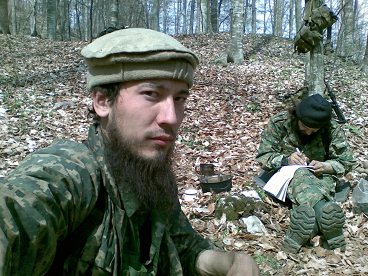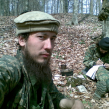
Caucasus Emirate’s Ethnic Russian Suicide Bombers
Publication: Eurasia Daily Monitor Volume: 9 Issue: 190
By:

The killing of the well-known Sufi sheikh Said Chirkeiski by a Russian female suicide bomber has again raised the issue of those in Russia who convert from Orthodox Christianity to Islam. The assassination of the sheikh was carried out by Aminat Kurbanova (maiden last name Saprykina), who had converted to Islam and was the wife of an armed resistance member. In the past 13 years since the start of the second Chechen military campaign, 46 female suicide bombers have carried out 26 terror attacks in Russia.
The adoption of Islam by ethnic Russians and their involvement in the North Caucasian Islamist armed underground is being discussed in the Russian press with increasing alarm. The question is whether Orthodox Russia has real reasons for concern. According to Russia’s leaders, it is a country where hundreds of ethnic groups that follow different religious paths coexist. Officials say that “Islam is rightfully an inalienable part of the contemporary religious, social and cultural life of Russia” (https://ria.ru/religion/20120830/733504906.html). In fact, Russia has the biggest Muslim community among European countries. According to various estimates there are an estimated 10 to 25 million Muslims in Russia (www.newsru.com/religy/29jul2008/moslems.html).
However, Muslims in Russia are a headache for the country’s leadership. Normally, the conversion of ethnic Russians to Islam is received very negatively in society. In a recent survey, 41 percent of the respondents called Russian Muslims “traitors to the Russian people”; 32 percent held a negative attitude toward the converts, but thought it was their personal decision; 14 percent had a neutral attitude; and 1.8 percent viewed their decision to convert positively (www.interfax-religion.ru/?act=news&div=48317). Russian society does not differentiate between a Russian man who converted to Islam out of conviction or a woman who converted after marrying a Muslim.
The chairman of the Muslim religious organization Pryamoi Put (Straight Path), Vasily Derevyankin, believes that most Russians who convert to Islam are not former believing Christians. “Those people who were Church-going Orthodox believers and then changed their views and converted to Islam can be counted with the fingers of one hand,” Derevyankin said (www.newsru.com/religy/02feb2011/neue_moslems.html). Derevyankin probably is not an Internet user; otherwise, he would have known that even the fingers of two hands would not be enough to count just the Russian Orthodox priests who converted to Islam, not to mention ordinary Russian Orthodox believers (https://clipiki.ru/video/189732/Islam-Istina-byivshiy-svyaschennik).
So what is the problem? The Orthodox believer in Russia who adopts Islam regards it as an alternative to something he already knows (www.psdp.ru/rights/77339498-2). The merging of the authorities with the Orthodox clergy in Russia has reached absurdly high levels (https://magazines.russ.ru/oz/2001/1/malkina.html), which repels young people. At the same time, these people come to regard Islam as an egalitarian community that is more independent of the government and has a mystical fraternal connection with the rest of the Muslim world. The converts tend to like the fact that the Islamic community adheres to strict moral principles, regulates the smallest details of life, provides a venue for common prayer in the mosques, etc. The impact of videos shot in Chechnya during the 1994–1996 war also should not be underestimated. Back then, Chechen fighters positioned themselves as Robin Hoods with green Islamic headbands. During the second war in Chechnya no one counted the number of ethnic Russians who fought on the Chechen side, but there were quite a few such instances. In March 2004, two ethnic Russians, Vitaly Zagorulko and David Fotov, were killed in Stavropol region. In 2005, Viktor Semchenko and Yuri Menovshikov were killed in Krasnodar region. Semchenko and Menovshikov staged bomb attacks on four bus stops and were preparing another terrorist attack in the city of Krasnodar. Nikolai Kipkeyev was killed in the terrorist attack on the Rizhskaya metro station in Moscow on August 31, 2004 (www.kp.ru/daily/23756/56219/).
The story of Said Buryatsky (aka Alexander Tikhomirov) is also instructive. Originally from Buryatiya, Buryatsky converted to Islam and became very popular among Russian youth on account of his lectures about the history of Islam. Having no higher Islamic education, Buryatsky eventually stood on par with the leaders of the Caucasus Emirate. At times it seemed that he was better known and more liked by the rebels than Doku Umarov himself. Said Buryatsky exemplified the trend of converts becoming leaders of those who were born into Islam (www.kavkaz-uzel.ru/articles/158565).
After Said Buryatsky died in March 2010, other Russian Muslims fighting under the banner of the Caucasus Emirate appeared. On February 14, 2011, two residents of the city of Pyatigorsk, Vitaly Razdobudko and his wife Maria Khorosheva, blew themselves up next to the police station in the village of Gubden, killing four people and injuring 20 (www.utro.ru/articles/2011/12/26/1019461.shtml). In July 2011, Viktor Dvorakovsky and Vladimir Skirko were arrested in the village of Inozemtsevo in Stavropol region. Dvorakovsky resisted his arrest by police and was wounded when he tried to detonate an IED. The two were declared to be Russian Wahhabis, and a court sentenced Dvorakovsky to 23 years and Skirko to six years in prison (www.yuga.ru/news/262798/). Finally, there was the Russian suicide bomber Aminat Kurbanova (aka Alla Saprykina), who blew up Sheikh Said Chirkeisky on August 28, 2012 (www.kavkaz-uzel.ru/articles/211915/).
It appears that Russian converts choose not simply Islam, but radical Islam (www.newsru.com/religy/02feb2011/neue_moslems.html). According to unconfirmed information, the Riyad-us Saliheen suicide bomber battalion in Dagestan is also reportedly headed by an ethnic Russian Muslim, 24-year-old Alexei Pashintsev (aka Emir Abdul-Malik) from the city of Belgorod. If this information is correct, it would explain why ethnic Russian suicide bombers have been so active in Dagestan in the past two years (https://newsru.com/russia/25sep2012/pashintzev.html). Moreover, the new Russian converts to Islam look for adventures not only in the Caucasus, but across the world (www.kp.ru/daily/24327.3/519171/). They can be found today not only in Afghanistan, but also in Syria.
So is the conversion of ethnic Russians to Islam a mounting new trend in Russian society? No. The few examples cited in this article do not allow us to say that there is a serious Russian segment in the Islamist resistance movement in the North Caucasus. However, the Russian government’s policies toward the Muslims of Russia pave the way for such a possibility in the future. Today, for a certain part of the ethnic Russian Islamic community, Islam’s image is equated with a person who fights the authorities with arms. This means that we will still have to deal with Russian jihadists in the North Caucasus and in Russia proper in the near future.




